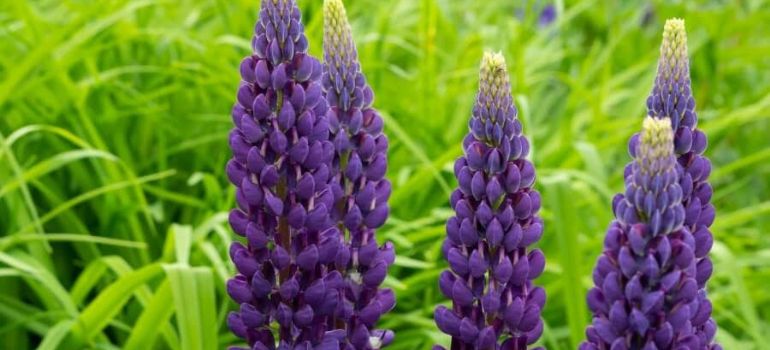Flowers have an enchanting way of captivating our senses, and among the myriad blooms, purple cone-like flowers stand out as a testament to nature’s artistic prowess. These unique blossoms, with their distinctive shapes and hues, have become a favorite among garden enthusiasts. In this article, we’ll explore the fascinating world of purple cone-like flowers, delving into their types, cultivation tips, symbolic meanings, and much more.
I. Introduction
Unveiling the Charm
Purple cone-like flowers, with their cone-shaped structures and varying shades of purple, add a touch of mystique to any garden. These flowers, belonging to different plant species, share a common allure that draws both seasoned gardeners and novices alike.
II. Types of Purple Cone-Like Flowers
A Kaleidoscope of Varieties
- Coneflower (Echinacea purpurea)
- Recognizable petals surrounding a prominent cone
- Medicinal properties and immune-boosting qualities
- Liatris Spicata
- Tall spikes covered in tiny purple florets
- Ideal for attracting butterflies and bees
- Agastache ‘Blue Fortune’
- Lavender-blue spikes with an anise fragrance
- Drought-tolerant and suitable for xeriscaping
III. Cultivation Tips
Nurturing Nature’s Masterpiece
To cultivate these stunning flowers successfully, consider the following tips:
- Soil Requirements: Well-drained soil with a slightly acidic to neutral pH.
- Sunlight and Water Needs: Full sun exposure and moderate watering for optimal growth.
- Pruning Techniques: Regular deadheading to encourage continuous blooming.
IV. Garden Design Ideas
Creating a Purple Haven
- Incorporating purple cone-like flowers into landscapes
- Planting in clusters for visual impact
- Mixing with complementary plants for a vibrant garden palette

V. Seasonal Care
A Year-Round Commitment
- Guidance on caring for these flowers during different seasons
- Spring and summer bloom care
- Winter preparations for a thriving garden
VI. Symbolism and Significance
Beyond Aesthetics
- Cultural meanings associated with purple flowers
- Representing mystery, elegance, and enchantment
- Symbolic representation in various traditions
VII. Challenges and Solutions
Tackling Garden Hurdles
- Common issues in growing purple cone-like flowers
- Addressing pests and diseases effectively
- Ensuring proper soil drainage to prevent root rot
VIII. DIY Crafts and Decor
Bringing the Outdoors In
- Creative ways to use these flowers in crafts
- Dried flower arrangements for long-lasting decor
- Pressed flower art and homemade potpourri
IX. Purple Cone-Like Flowers in Art
Nature’s Influence on Creativity
- Influence on art and aesthetics
- Featured in paintings, sculptures, and photography
- Celebrating the beauty through artistic expressions
X. Benefits for Pollinators
Nature’s Pollinator Buffet
- The role of these flowers in supporting pollinators
- Attracting bees, butterflies, and hummingbirds
- Creating a pollinator-friendly environment
XI. Health and Medicinal Aspects
From Garden to Medicine Cabinet
- Historical uses in traditional medicine
- Native American remedies using coneflower
- Modern research on potential health benefits
XII. Purple Cone-Like Flowers in Literature
Blooms in Verse
- References in literature and poetry
- Walt Whitman’s ode to coneflowers
- Cultural impact on literary works through the ages
XIII. Popular Varieties in Gardening
Cream of the Crop
- Overview of highly sought-after varieties
- ‘Magnus’ with its deep purple petals and orange cones
- ‘PowWow Wild Berry’ known for its compact size and vibrant color
XIV. Fun Facts
Beyond the Blooms
- Intriguing facts about purple cone-like flowers
- Some varieties used in herbal teas and infusions
- The significance of the coneflower’s seed head in winter gardens
XV. Conclusion
In conclusion, purple cone-like flowers offer a symphony of nature’s elegance, weaving beauty, symbolism, and functionality into the fabric of a garden. Whether you’re an avid gardener or someone just beginning to explore the wonders of horticulture, these unique blooms are a perfect addition to any landscape.
Frequently Asked Questions (FAQs)
Can I grow purple cone-like flowers in containers?
- Absolutely! Choose smaller varieties for containers and ensure proper drainage.
Are purple cone-like flowers deer-resistant?
- Yes, many varieties, especially coneflowers, are known to be deer-resistant.
How do I dry purple cone-like flowers for crafts?
- Harvest the flowers before they fully open, and hang them upside down in a dry, dark place.
What is the best time to plant purple cone-like flowers?
- Spring or fall is ideal for planting to allow the roots to establish before extreme weather.
Do purple cone-like flowers attract beneficial insects?
- Absolutely! They are excellent for attracting bees, butterflies, and other pollinators
